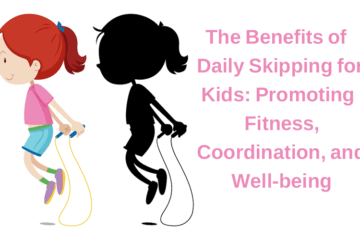Physical activity is essential for children’s overall health and development. Here are some key points regarding physical activity for children:
Importance of Physical Activity:
Physical activity promotes healthy growth and development in children. It helps build strong bones and muscles, improves cardiovascular fitness, enhances coordination and balance, and boosts overall physical and mental well-being. Regular physical activity also reduces the risk of obesity, chronic diseases, and improves cognitive function.
Recommended Levels of Physical Activity:
Children should engage in at least 60 minutes of moderate to vigorous physical activity every day. This can include activities like running, jumping, swimming, dancing, playing sports, or riding a bicycle. Encourage a variety of activities to keep children engaged and interested.
Benefits of Active Play:
Encourage children to engage in active play, both indoors and outdoors. Active play allows children to explore their environment, develop gross motor skills, and improve their coordination and balance. It also stimulates their imagination, social skills, and promotes problem-solving abilities.
Limit Screen Time:
Excessive sedentary behavior, particularly screen time, can have negative effects on children’s health. Encourage limits on screen time and prioritize physical activity instead. Set guidelines for electronic device usage and create screen-free zones or times during the day.
Active Family Time:
Promote physical activity as a family by engaging in activities together. Go for walks or bike rides, play games in the park, or participate in sports as a family. This not only provides quality time but also sets a positive example and encourages children to lead an active lifestyle.
Encourage Team Sports and Group Activities:
Enroll children in team sports or group activities that promote physical activity, teamwork, and social interaction. This can include soccer, basketball, swimming, dance classes, martial arts, or gymnastics. Such activities help children develop physical skills, build self-confidence, and foster social connections.
Safety Considerations:
Ensure that children engage in physical activities in safe environments. Provide appropriate protective gear, such as helmets, knee pads, or life jackets, as needed. Teach children about safety rules, proper warm-up exercises, and the importance of staying hydrated during physical activity.
Be Supportive and Fun:
Encourage children to find physical activities they enjoy. Support their interests and provide opportunities for them to explore different activities. Make physical activity fun by playing games, creating obstacle courses, or organizing family challenges. The more enjoyable and engaging the activity, the more likely children will be to participate regularly.
Remember, it’s important to consult with healthcare professionals or pediatricians for specific guidance regarding physical activity recommendations based on a child’s age, abilities, and any individual considerations. By promoting and participating in regular physical activity, you can help children develop lifelong habits that contribute to their overall health and well-being.





